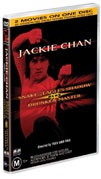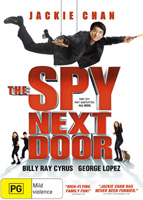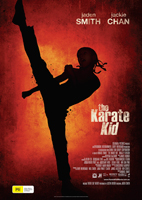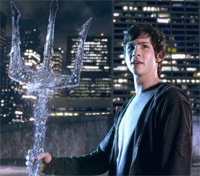Jackie Chan The Foreigner
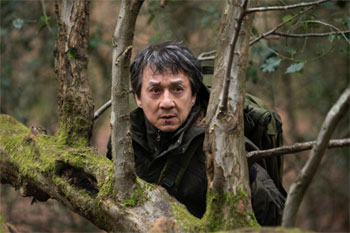
Jackie Chan The Foreigner
Cast: Pierce Brosnan, Jackie Chan
Director: Martin Campbell
Genre: Action, Thriller
Running Time: 114 minutes
Synopsis: The Foreigner is a gripping and relevant action thriller directed by a master of the smart action genre, Martin Campbell (Casino Royale and Goldeneye.) Justice, retribution and redemption are at the heart of this provocative story of two men whose hidden pasts explode in the present.
The film marks a blazing return to the screen by Jackie Chan (the Rush Hour trilogy, Skiptrace) and Pierce Brosnan (Tomorrow Never Dies, The November Man), two actors in roles that take full advantage of and build upon their legendary star status. The film tells the story of humble London restaurant owner Quan (Chan), whose long-buried past erupts in a revenge-fueled vendetta when the only person left for him to love " his teenage daughter " is taken from him in a senseless act of politicallymotivated terrorism. As he searches for the people responsible, he seeks the assistance of Irish Deputy Minister, Liam Hennessy (Brosnan), an ill-fitting government official whose own troubled history comes to bear down on him.
As Quan enters into a game of political cat-and-mouse with Hennessy, both men must confront their pasts as they try to identify the elusive killers. 'This film is about settling your demons," says producer Scott Lumpkin. 'It's about justice. It's about paying a price for what you do. Quan is wrestling with tragedies in his past. He's wrestling with his history and he's had enough. He's ready. It's time to pay back those that have done wrong for everyone. And that's really what this film is about."
The story of The Foreigner - its themes and its specific story - is a sometimes disquieting reflection of the fragile world we inhabit. The characters portrayed by Chan and Brosnan are intriguing examples of the complexities of living in a global society where belief can become action without empathic consideration of consequence.
The Foreigner
Release Date: October 12th, 2017
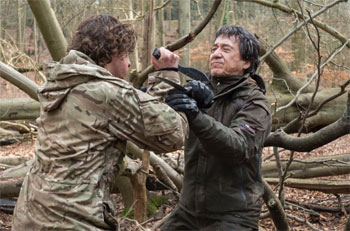 About The Production
About The Production
Introduction To The Story
A first-rate action thriller that feels at once familiar, yet fresh and exhilarating, The Foreigner is filled with political intrigue, tragic loss, and a quest for justice that centers on Quan Ngoc Minh (Chan), a quiet, dignified man whose life is shattered by the reverberations of a senseless terrorist act.
Following this tragedy, he embarks on a quest for retribution, seeking assistance from Irish Deputy Minister Liam Hennessy (Brosnan), a politician whom Quan believes has information about the persons responsible. Hennessy is a former IRA member now working within the British government to uphold the tenuous peace accord in Northern Ireland.
As the film begins, Quan picks up his 15-year-old daughter, Fan (Katie Leung), from a London school and drives her to a boutique to buy a dress for a school dance. The excited teenager hops out to race into the shop, leaving Quan to park. An instant later, a bomb blast shatters Quan's world, claiming multiple lives, including Fan's.
After a group calling themselves The Authentic IRA claims responsibility for the bombing, Irish Deputy Minister, Liam Hennessy is tasked by the British government with finding out their identities and preventing future attacks. A former IRA operative who now works for the British government and is striving to uphold the peace accord, Hennessy has the contacts to ferret out the bombers' identities.
In the days following the bombing, Quan grieves the loss of his only remaining family. He pleads with local authorities, patiently waiting to see someone who can give him the names of the bombers. Finally, Commander Bromley (Ray Fearon) meets with Quan, who offers up his life savings in exchange for the names. Bromley empathizes and assures him that they are also looking for the terrorists, but discourages Quan from pursuing the matter himself.
After three weeks with no new information, Quan escalates his query after seeing Hennessy on TV, repeatedly phoning Hennessy's office at all hours to speak with him in fruitless attempts to obtain the identities of the men responsible.
Frustrated by the paralysis of bureaucracy, with his grief transforming from a slow boil into quiet fury, Quan reaches a tipping point. He goes from a man who has lost everything to a man who is willing to do anything to avenge the death of his daughter and bring those responsible to justice. As Quan's mission begins, we learn that the aging restaurant owner has a past that makes him uniquely equipped for getting answers.
Quan travels to Belfast and appears unannounced at Hennessy's office to make his appeal in person. He is permitted a meeting with the Deputy Minister, which yields no information. Having anticipated this, he begins ramping up the pressure on the politician, planting small devices intended to alert Hennessy that, although he has not gone for bloodshed, he is able to get to Hennessy"and is determined to get the names. When Hennessy sends his henchmen to apprehend Quan, we see that the quiet, seemingly gentle man in his sixties is more than he appears. A four-on-one ambush set in a small Belfast bed and breakfast explodes in breathtaking action as Quan's unexpected agility and hand-to-hand combat skills enable him to elude four armed men. As the dynamic between Hennessy and Quan escalates, Hennessy frantically works to uncover the rogue IRA cell behind the plan, and enlists his nephew, Sean Morrison (Rory Fleck Byrne) to meet with Commander Bromley to set up a sting operation to identify the bombers. Hennessy and his wife, Mary (Orla Brady) retreat to the safety of their remote farm"a plan that soon proves futile, as Quan infiltrates the country estate and creates more mayhem intended to force the Deputy Minister's hand. In the film's explosive third act, the full force of Quan's and Hennessy's unrevealed pasts come roaring to the present as multiple threads of the narrative combine in unexpected ways. The action intensifies, tensions escalate, alliances shift, and secrets are revealed, as Quan and the authorities separately race to find the identities and motives of the bombers.
From Page To Screen: The Foreigner's Journey
Based on acclaimed crime writer Stephen Leather's 1992 novel, 'The Chinaman," The Foreigner gets a present-day update by screenwriter David Marconi (Enemy of the State, Live Free or Die Hard). While the novel was set in the early 90s during 'The Troubles" " the period when the IRA were bombing the UK and Northern Ireland " the film's producers felt that the main themes could be equally powerful in a current setting.
Producer Wayne Marc Godfrey recruited Marconi to adapt Leather's novel, given Marconi's track record of success in action thrillers. Producer Arthur Sarkissian subsequently gave the script to Martin Campbell as a potential directing assignment. Together they worked with Marconi revising the script. STXfilms, a division of Robert Simonds' STX Entertainment, later optioned the script from Godfrey and Sarkissian, with Chan attached to play Quan. STXfilms' then head of production Cathy Schulman oversaw a new draft of the screenplay, focusing on designing it as a 'two hander". Both Quan and Deputy Minister Hennessy were battling similar demons based on their shadowy backgrounds. Schulman suggested that Hennessy's role be fine-tuned to attract Schulman and Campbell's mutual friend and collaborator Pierce Brosnan. 'While we were working on it, we knew that Jackie Chan would be playing Quan and we had Pierce Brosnan in our sights too," says screenwriter David Marconi. 'So, when I was doing the script, it was with these actors in mind."
It was a lengthy process, which included contributions from director Martin Campbell, once he came onboard the film. 'We worked on the script together for about four or five months," recalls Marconi. 'We had a great working rapport which is essential, and Martin's ideas were spot on. Martin elevated the script to another level, his notes and suggestions were very clear. He was as concerned about character as am I."
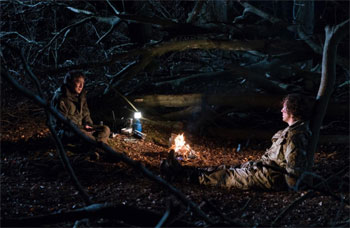 'This is a story of revenge where the main character is a man who's had a tragic past. Two of his daughters were killed in terrible circumstances several years ago, and his wife dies soon after they have established a new life of safety in the UK, and now 15 years later, his only daughter is killed, so he has nothing left to live for," explains Marconi. 'His journey of revenge ultimately becomes one of redemption. It took me about 2 1/2 years of writing and rewriting. I had to break the book down. Stephen wrote a very good book that I was able to do an adaptation from."
'This is a story of revenge where the main character is a man who's had a tragic past. Two of his daughters were killed in terrible circumstances several years ago, and his wife dies soon after they have established a new life of safety in the UK, and now 15 years later, his only daughter is killed, so he has nothing left to live for," explains Marconi. 'His journey of revenge ultimately becomes one of redemption. It took me about 2 1/2 years of writing and rewriting. I had to break the book down. Stephen wrote a very good book that I was able to do an adaptation from."
'One of the biggest challenges was updating it from the 90s to present day. It was very important to take the issues of today and put them into this novel that was set in the past. We had to reinvent and update certain things so the technologies and the threats were more contemporary," says Marconi. 'I didn't want to make the IRA the bad guys, because they've made peace. But there are upstarts in the organization who haven't signed up to peace that are out there still trying to do things. I had to find the different shades of the villains and try and present all sides so the bad guys weren't all one color and the good guys weren't all one color. It's about various shades of greys because the world that we live in is a very grey world. You have to get inside the heads of all the characters, including the villains, so you can understand why people do what they do."
The Author Stamps The Foreigner's Passport for Journey to The Silver Screen
'I wanted to do a story about a man who was underestimated by people," says novelist Stephen Leather. 'A man who nobody took seriously, who isn't considered a threat." All too often, screen adaptations of novels bear little resemblance to the source material, leaving authors disgruntled. Thankfully, that isn't the case. Although the film has shifted the story to the present day from its early 90s setting, the original themes and foundation remain. 'It's my book and it's the filmmakers' movie," says Leather.
'David is a brilliant writer and he's done such a great job of writing the script. He's changed a lot of elements. We had to update the technology. And it's very true to the story and to the characters I wrote. So, I'm very pleased that David's given it an extra edge. Martin's action scenes improve it. And he's put more intensity in it. I think it's brilliant, absolutely brilliant. And to be on set surrounded by 100 people filming a story that I wrote in my little room 25 years ago is thrilling."
Complex Men With Troubled Pasts: Casting The Leading Men
From Action Star To Dramatic Actor: Another Side Of Jackie Chan
Jackie Chan is legendary for his explosive martial arts action sequences and larger-than-life performances, so playing a character with the quiet, almost solemn intensity of Quan was an exciting new challenge for Chan. 'I wanted a change," says the action legend. 'I don't always want to do the same kind of film - Chinese Zodiac is an Indiana Jones-type film, Shinjuku is a tough film, Skiptrace is a comedy - so every year, I try to do something different. I want to be an actor so this is a big change and it will give audiences a chance to see another side of Jackie Chan."
Even more than the action, it was the heart-rending poignancy of the story that appealed to Chan. 'Quan is a lovely father," he says. 'After the terrible tragedy of his life in Vietnam, having seen his two daughters kidnapped and raped by Thai pirates, and then his wife dies when their youngest daughter, Fan, is born in London, his life is all about loving her and protecting her. When she is killed, he has nothing left. He is desperate for revenge, not only for Fan's murder, but for the innocent who are killed by bad people."
Chan embraced the opportunity to break out of his typical action-hero persona and tackle a serious dramatic role. 'He immersed himself into the character of Quan. It's a character we haven't seen him play before. We all expect Jackie to come in and start -kung fu-ing' everybody, but Jackie's approached the character from a cerebral perspective," explains Lumpkin. 'The character is all about thinking through his actions, he meticulously plans how he's going to approach his antagonists, he plans how he's going to get revenge for his daughter, he meticulously looks for justice. And you can see that in his mind as the character develops."
'He is obviously completely and emotionally wrecked by the death of his daughter. And he very quietly goes to the police to ask who did this. He is a quiet man with a simple life; he makes a living from his Chinese restaurant. He is dignified," says Campbell, discussing Quan's journey for justice, 'He even, at one point, in his naivety offers the police chief all his life savings in order to at least get a clue- a name- about who could have done this atrocity."
'Quan has a history. He was a Nùng fighter in Vietnam, so he worked with the US soldiers, in training, in guerrilla warfare, so he's got a real history of how to be a badass," adds Lumpkin. 'He knows how to defend himself; he knows how to protect himself; and he knows how to find the answers. And that's really his mission: to find answers and to seek justice."
After being dismissed by Hennessy when he asks him who killed his daughter, Quan realizes he must draw on the skills and training from his secret past to convince Hennessy to take him seriously. 'Quan does little things - he puts small bombs in his office and in his car which are not meant to hurt or maim - but Hennessy knows if Quan wants to, he can kill his whole family," says Chan. 'Quan just wants Hennessy to give him the name of the bombers. He's stubborn and he wants revenge." As Quan's frustration increases, so do the demonstrations of his capabilities. As Campbell puts it, 'Quan has nothing to lose. And he doesn't think for a minute he is going to live through this," states Campbell. 'And he doesn't care. It's just morally what he has to do."
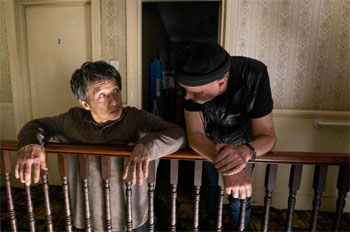 'The most surprising thing for me with Jackie was how quickly he became Quan," adds Producer Jamie Marshall. 'We were a little anxious about Jackie, who has so much energy and youth, playing an older man but after hair and makeup and three hours of rehearsals with Martin, he came in on the first day of shooting as Quan. I was blown away. And he's brilliant to work with, a lovely man with a very generous spirit. For me, no one else could have played this role." The result is a complex and compelling performance, which may surprise audiences and Jackie Chan's fans alike.
'The most surprising thing for me with Jackie was how quickly he became Quan," adds Producer Jamie Marshall. 'We were a little anxious about Jackie, who has so much energy and youth, playing an older man but after hair and makeup and three hours of rehearsals with Martin, he came in on the first day of shooting as Quan. I was blown away. And he's brilliant to work with, a lovely man with a very generous spirit. For me, no one else could have played this role." The result is a complex and compelling performance, which may surprise audiences and Jackie Chan's fans alike.
Chan also gets to show off some serious acting chops. 'In the opening scene when the bomb goes off, you really feel that shock in Quan as he's blown across the car," says Lumpkin. 'He gets up with glass in his face, and there's smoke and fire and blood everywhere. And watching the scene where Jackie's holding his daughter, it was really moving. Jackie really brought his A-game for this role. Even watching the dailies, it's choking."
Of working with Chan, Brosnan says, 'I was a huge Jackie Chan fan and am even more so now having worked with him. He's just one of these legends of the cinema, someone who has fantastic comedic timing, wonderful alacrity on his feet, and for him I think this movie is a great departure and one that will surprise the fans who love him. We had a good time. I'm really proud to have worked with him. I love saying -I'm working with Jackie Chan.' It always brings a smile to people's faces."
'Jackie Chan is single-handedly one of the coolest people I have ever met in my life!" says Lumpkin. Campbell recalls the story of visiting Jackie in his dressing room, 'I remember the first day of shooting, I went to the makeup trailer, and there he was sweeping out the trailer. You know, like cleaning it out. And that's just Jackie."
Stephen Leather concurs: 'Jackie Chan is great. It's a side of him we've never seen before. We're used to seeing the Kung Fu and the slapstick fighting, but here he's acting with depth and emotion and it's superb! A lot of the time he doesn't even look like Jackie Chan - the way he moves his face, how he talks, is so different. And you feel the raw emotion the guy's putting out. It's a great bit of acting."
Campbell states it more succinctly: 'He's simply excellent."
Pierce Brosnan: From Secret Agent to Government Agent with Secrets
Playing Liam Hennessy, the former IRA-commander-turned–British-governmentofficial is Pierce Brosnan. For Lumpkin, Brosnan is a man who 'oozes class. He was James Bond, he was Remington Steele, and he's everything that we have always wanted to be when we watch a movie. Pierce brings a sense of balance, coolness and class to the character of Hennessy. You look at Hennessy at first and you think -what a classy cool guy.' But he's got a dark past. And there's really no one else who could play that role like Pierce."
Says Brosnan of his character, 'He's someone who was born of war, really, he grew up in The Troubles in Ireland. He's very bright, very articulate, and someone who is trying to hold onto his own position in government and within his own people in the north of Ireland."
Reuniting Martin Campbell with his former Bond was an easy sell. 'Well first of all, Pierce is Irish, which helps. I think this one of the best things he's ever done," says Campbell. 'He threw himself into that role. I remember him saying to me [he] was a little worried about the IRA, being Irish and doing a story like this. However, he went into it with his eyes open. And for once, I got some rehearsal time with him before we started, so that helped. I think the character he finally came up with is absolutely fascinating."
'Hennessy is as we would expect a politician to be, withholding answers and information," says Lumpkin. 'He sees Quan as simply a foreigner and doesn't pay him any attention " until Quan shows what he's capable of. Hennessy realizes this is serious, but he has a lot of other things going on. He's got to build up his power base, which is beginning to dwindle. He's got to handle [former IRA colleague] McGrath and his rogue forces. Pierce does a fantastic job of playing Hennessy. He's got a really solid sense of style in what he brings to the role. Hennessy is completely believable - he's got a great charm at the beginning, but slowly he reveals how much of a bad-ass he is."
 Jackie Chan was also thrilled with his co-star, both personally and professionally.
Jackie Chan was also thrilled with his co-star, both personally and professionally.
'I'm honored to work with him," says Chan. 'He's one of the biggest movie stars and he's so good. He helped me a lot on set, not just with my acting but my English as well. I wasted a lot of time because my English is not so good, and also, I have to pretend I'm a British citizen – and he helped me a lot. He was very patient. At the end of shooting he gave me a painting he had painted, he's a true artist."
'Pierce is fantastic," agrees Marconi. 'Martin and Pierce had worked together on Goldeneye and for Martin to bring him on was a tremendous choice. He brought a real gravitas to Hennessy. This is one of the strongest roles I've ever seen him do."
Leather was also very happy with the finished product. 'I couldn't ask for a better director. Jackie Chan in the lead role - you couldn't ask for anyone better. And Pierce Brosnan - when I wrote the book 25 years ago, I had Pierce Brosnan in mind for Morrison, the Irish guy who gets called over from the United States to hunt down Quan. It's funny that 25 years later he's grown into the role of Hennessy, who is the other great character in the book. So, I'm absolutely thrilled that he was in it."
Orla Brady
As Hennessy's wife, Mary, Orla Brady is a ticking time bomb of frustration. It was a role the actress found appealing for a number of reasons. 'I was very intrigued by the notion of a vengeful woman," she says. 'A woman who, instead of internalising her disappointments and accepting them, turns her fury outwards and lashes out at the very person who she sees as the object of her pain and distress: her husband. I've often played women who destroy themselves, and they're all interesting to play, but I liked the unleashed fury of this role."
Brady did a lot of research into the role, reading first-hand accounts of women who went on hunger strikes during the height of 'The Troubles." 'Martin really wanted to find the truth of this woman," says Brady. 'He wasn't interested in creating crude stereotypes. He's very interested in story and the fact that good people can have bad moments and bad people can rise above themselves sometimes. In other words, there isn't such a thing as a good or bad character. A lot of people become very compromised and Mary is certainly compromised. She begins to see her husband isn't the strong leader she hoped he would be and she feels the cause has been betrayed, so she switches allegiances."
The film's leading men and director were major reasons Brady was drawn to the project. 'I very much wanted to work with Jackie Chan. It's been revealing seeing him play a very dramatic role, with no comedy at all, and his performance will really surprise audiences. He's the moral heart of the film really whereas my character is the opposite - she's a venal person who is compromised, who is about an ideology rather than compassion. Pierce Brosnan and Martin Campbell were also incentives. 'Pierce is a bit of a legend " especially in Ireland " and Martin Campbell has an extraordinary sensitivity around the subject matter, so with all these elements, I really couldn't say no!
Pierce makes it as easy as it can possibly be to be on set. There was a scene where I am talking to him on the phone. A lot of actors will take a break if they're not going to be in the scene and do the call from their trailer but Pierce stayed in the room and that was really great. And he did it without any hoo-ha."
Rory Fleck Byrne
Rounding out the leading cast is Rory Fleck Byrne as Sean Morrison, Hennessy's nephew and a former member of the Royal Irish Regiment who is brought back from New York to track down Quan in the Irish countryside. 'Morrison understands loss. He would have lost the majority of his family along the way during 'The Troubles." And Liam Hennessy took him under his wing and looked after him over the years and it's become this father-son relationship," explains Byrne. 'There is trust and loyalty. And that's what makes it such a great and complex relationship, because as the story unravels, you realize there's some hidden secrets there."
The actor was immediately impressed with the script. 'I could see the story in my head and it was visually stimulating. And the idea of intertwining IRA themes with someone like Jackie Chan was very unusual – I'd never seen anything like that before."
The producers had to find the right actor that could handle the physical and emotional integrity needed in the scenes between Quan and Morrison. Marconi says, 'If there are two people who really connect, it's Quan and Morrison, because of their shared past as soldiers. Quan sees Morrison as a kindred spirit, as both men are conflicted: Quan because he switched sides during the Vietnam War, and Morrison because he's an Irish Catholic who fought with the British army in Iraq."
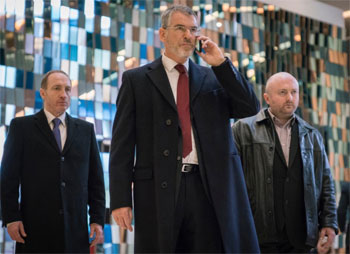 Byrne also bonded with Pierce Brosnan in an unexpected way. 'Pierce is fantastic – he just operates on another plane somewhere. I had only met him once before and as we were preparing for a scene he just started telling me about his past, and my jaw dropped because I wasn't expecting him to say something about himself so openly. We're both only children, a bit of a dying breed, so we high-fived about that. You can't help but want to listen to him. You can't help but want to lean in. He's got a little glint in his eye. It's just magic working with him."
Byrne also bonded with Pierce Brosnan in an unexpected way. 'Pierce is fantastic – he just operates on another plane somewhere. I had only met him once before and as we were preparing for a scene he just started telling me about his past, and my jaw dropped because I wasn't expecting him to say something about himself so openly. We're both only children, a bit of a dying breed, so we high-fived about that. You can't help but want to listen to him. You can't help but want to lean in. He's got a little glint in his eye. It's just magic working with him."
Michael Mcelhatton
Michael McElhatton was cast as Kavanagh, Hennessy's fearsome consigliore. 'I thought it was a great script," says the actor best known for 'Game of Thrones." 'It's very much in the classic genre revenge movie, but there's lots of things that unfold towards the end of the story that turn it into something other than a traditional linear narrative. And I wanted to work with Martin Campbell, who's a fantastic director."
Campbell and McElhatton spent a good deal of time discussing Kavanagh's backstory. 'Martin wanted Kavanagh to be a kind of consigliore to Hennessy, a trusted ally as much as a heavy," says McElhatton. 'Kavanagh has probably been with Hennessy for quite some time, all through 'The Troubles" in the 1970s, and Hennessy is now on the legitimate side of the IRA. And he has adjusted accordingly. But as we see the movie progress and things start closing in around Hennessy, he relies on Kavanagh more and more and we realise that Hennessy hasn't quite changed as much as his public persona suggests."
McElhatton also relished working alongside Jackie Chan. 'All my scenes with Jackie are action scenes and that's pretty exciting for me," says the actor. 'But he's not just doing action here. He does the action guy and also the very submissive, quiet, nondescript guy and he does both incredibly well. He's such an instinctive actor and it's been fascinating to watch him."
It was also a pleasure to work with Martin Campbell: 'He's so accomplished," says McElhatton. 'Every day on the set, he would be completely running the show. He has his shots worked out, he knows exactly where the cuts will be, he would tell us actors where the cuts would be, which is incredibly helpful because it means you're not asking where the camera is or why it's being shot in a particular way. He knows exactly what he wants and he's great in the detail and he gave us great notes. He's also very fast and his energy is quite infectious so he's an absolute joy to work with. I think Martin has brought a great degree of tension and drama and excitement to this movie. And the story has lots of complexities and plot twists, so it'll have a very broad appeal."
Martin Campbell: The Director Calls -Action!'
The perfect man to bring all this action to the screen is Martin Campbell, a director with an impressive track record, including the first films for two different iterations of James Bond. Campbell first directed Pierce Brosnan's debut as the legendary spy in 1995's Goldeneye. Then, over a decade later, he found himself ushering in another new era of Bond with 2006's Casino Royale, to acclaim from critics and fans alike.
Campbell's work has helped define and redefine the action genre and his passion for filmmaking is evident. 'Martin's a filmmaker's filmmaker," says Lumpkin. 'He lives, breathes, sleeps, eats film. If you go to dinner with Martin at night, we talk about film. If you get up in the morning, and you go to breakfast, you talk about film. If you talk about this film, it's what shots you're going to do, it's about breaking it down, and it's completely meticulous. And what makes Martin the right director for this film is he's genuinely thought through every element, every single step of the process, every back little bit of the story."
'When I first met Martin Campbell, I was astonished by how well he knew the script," says Chan. 'He knew everything about my character Quan " how he looks, how he thinks. And when we started filming, what amazed me is how focused he was on the set. That's exactly the kind of director I like. I've never seen a director who is on set for 18 hours and never leaves - he reads the script, eats, drinks, does everything on the set! I never even saw him look at his cellphone. I really respect him and how focused he is. On the set, he's like a man twenty years younger," laughs Chan.
'You could make up a question about a character, and he'll instantly have an answer," continues Lumpkin. 'He's that prepared. He adds a sense, to this particular film, of darkness and of light, of humor and of the intensity that he brings to life, even behind the camera. And so, to me, there's really no other question this film is going to be magic because of the vision that Martin is able to pull through the cast and our locations, and everything we've been able to put together to surround him with."
'Martin and Pierce have a fantastic relationship that spans the years - they communicate via shorthand - and it's been a pleasure watching them work," says Marconi. 'It was a great learning experience being on the set and watching them all work together and seeing the way Martin listened to performances and the way he communicated with the actors."
Says Brosnan, 'Martin is a taskmaster. He is a man who comes to work fully prepared. He knows the script inside out and he knows every angle that he wants to shoot. So, he's a grandmaster of the thriller, and his preparation is extensive. He rules the set with a delightful passion. You have to be on your game [and] you have to be fully prepared. But he's also a most gracious man and takes his time and will take as much time in the day to get the scene as right as possible, and as perfect as possible."
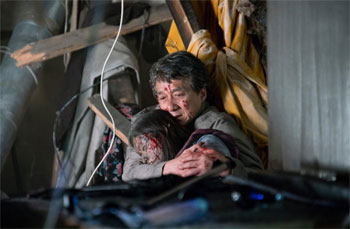 An Actor Prepares, The Director is Prepared
An Actor Prepares, The Director is Prepared
'Martin is the most prepared director I've ever worked with," says Marshall.
'When he has a plan, he executes that plan - he tells you every shot he's going to do, who is going do it, the order he's going to do it, and 9 times out of 10, that's how it goes. He's a great decision maker, very supportive and rarely changes his mind. And his work ethic is unbelievable. I wouldn't have worked for him for 19 years if I didn't have a lot of respect for him. He's a joy to work with and I have a huge amount of respect for him."
From Script To Screen Creating The Look And Feel
The team spent three months in prep before the November 1ststart date. After scouting locations both in the UK and across the Irish Sea in Northern Ireland, they decided it would be a more effective use of the budget to shoot the entire film in the UK.
London and Luton, a town just north of the capital, stood in for Belfast, with just minor second-unit work in Belfast for some key exterior locations.
'When the project finally got the go ahead, the decision was made to shoot it in the UK, so we started to tailor the script for the specific locations," says Marconi. 'We had to move very fast because of our schedule. We wanted this kind of gritty feel to the movie," says Campbell. Achieving the desired look and feel required a mindful collaboration between key behind-the-scenes talent, including Production Designer Alexander Cameron, Director of Photography David Tattersall, and Costume Designer Alexandra Bovaird.
Cinematography
Director of Photography David Tattersall (The Green Mile, Star Wars Episodes I, II, & III) is no stranger to action. He also found himself in familiar territory, having previously worked with Pierce Brosnan on Die Another Day, and he has been a longtime collaborator of Martin Campbell's, dating back to Vertical Limit in 2000, so this film didn't take much convincing; he joined up as soon as Campbell signed on.
'David was working with us in New Orleans on the other film which stalled and when Martin read this script, he just said, -All right, go ahead and call Tat,'" says Lumpkin. He continues, 'David adds a real sense of texture. David and Martin are a great match. David has great suggestions and great ideas with framing, as does Martin, so they work together as a really good team. It's fun to watch them both behind the camera, and then off of set too, outside of work, because they have the same banter. It's a really good dynamic."
On Location: Production Design
'We knew as soon as we met Alex[ander] Cameron that he was the one," recalls Lumpkin. 'Alex came with drawings, he came prepared, and he came with the idea. He'd done his homework and knew about Martin. As soon as the interview was over, Martin looked over at us and said, -That's the guy!'"
One of the key locations used was the street in Pimlico, which stood in for the Knightsbridge location for the bomb that opens the film and kicks off the action. This key sequence took twelve weeks of advance prep, including negotiations with the City of Westminster, prior approval from all neighboring businesses, planning, and construction. 'We couldn't get permissions right in the center of London," says Cameron. 'We used the Migrant's Centre for the bank and next to it was an empty shop that we turned into the boutique. The location was great for the kind of the access that we were allowed to have. The two facades are very different - Martin wanted the bank to be imposing and a real symbol of bureaucracy and the boutique to be very elegant - and I was very pleased with the result. We had to build a facade for the bank with toughened glass which would shatter safely when the bomb went off." The finished shot earned high marks from Lumpkin: 'It looks spectacular. The team exceeded all of our expectations with what they've done."
Still, the biggest challenge was finding the farmhouse to stand in for Hennessy's farm. 'It had to have so many elements to it," says Cameron. 'Eventually we found a location that had all the out houses and barns that we needed." The farm location also serves as the setting for several confrontations between Quan and Hennessy's men, including a thrilling forest battle between Quan and Morrison, the former Royal Irish Regiment soldier summoned by Hennessy to flush out the elusive 'foreigner." These two former military men square off, calling on their respective training and combat skills in a brutal hand-to-hand battle with a surprising outcome.
From Quan's humble flat with its Spartan décor, to the contrasting luxury of Hennessy's home and farmhouse, Cameron's attention to detail is evident. Still, Cameron had to be flexible with his designs and be able to alter them according to the exigencies of the production. 'At the end of the film, the bombers are holed in a flat and the original script had the SO19 team entering the flat through the windows from the outside. But after consulting our security advisor, we had them coming into the flat through the ceiling."
Costume Design
A key part of the creative equation was finding the right costume designer" which was easy, once they met with Alexandra Bovaird. 'Alex put together an amazing book and really impressed everyone right off of the bat," says Lumpkin. 'She had really done her homework. Hiring her was a no-brainer. We knew that she was the right one for the job."
'It was great working with Martin Campbell," says Bovaird. 'He was a very inspiring director, he methodically thought through everything. When I had my first meeting with him, I took a lot of photos and sketches based on my research. I had taken a lot of photos of old Chinese men in New York where I live, and Martin really responded to those references."
'Martin wanted a very authentic look for everybody. He didn't want to do the sort of movie version if you like, the sexed-up version of these political figures. He wanted to make it very real, which really excites me too " not just getting good looking people to look, you know, good looking. We actually had to go the other way with Pierce and take some of the suave out of him," she explains. 'If you look at the footage of the northern Irish assembly, they don't look great, clothes-wise. Their suits are out of date, they don't fit them very well, and they don't put things together very well, in terms of the shirts and ties and suits. We tried to mimic that and " with a little bit of artistic license "make sure they looked decent."
Bovaird wanted the same for Quan. 'We wanted him to be real, so all the clothes are aged, they don't look new, and that's quite hard to achieve sometimes. But we made sure everything is broken down so it doesn't look like it came straight out of a shop. I bought second hand pieces online or in thrift stores but the number of stunts meant that I had to buy off the rack so that we could buy multiples in case they were ruined during the takes."
According to Bovaird, Jackie Chan was a breath of fresh air. 'The fitting was something else like I've never experienced!" she says. 'I felt like I was in a Jackie Chan movie in the fitting because he came in and he had all these ideas about the stunts.
One of the jackets had a hood, so he got the hood and thought of all these different things he could do with the hood and he acted them out in the fitting! He smothered someone with it, he pretended to pick up a stone and hurl it - it was a fun fitting! He removed a sleeve and used it as a weapon. He goes through the stunts and works out how he can use the wardrobe as props. He also had certain requirements for the action scenes. For example, he had to have wide legged trousers to hide the protective pads." The end result was a very specific color palette - greys, beiges, blues and blacks - giving the film a uniformly cool, muted tone that looks out of date rather than modern, perfectly conveying the gritty, realistic feel Campbell wanted.
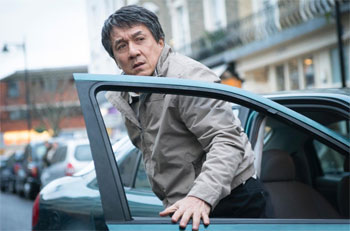 Bombs And Blows: The Stunt Team Makes It Happen
Bombs And Blows: The Stunt Team Makes It Happen
A bomb in Knightsbridge, a bus explosion on Lambeth Bridge, a mano-a-mano fight in the dense forests of Northern Ireland, and a four-against-one fight in a tiny kitchen" these are just some of the scenes that employed the skills of the special effects and stunt teams.
Jackie Chan sums up the style of the fight sequences in the film with four simple words: 'Quan is not Superman." Campbell was keen that Quan use his fighting skills as a defense rather than attack and for the action to always be tough, real and believable. Quan is, after all, a man in his sixties, so a slower pace is only to be expected. There are three key fight sequences: Quan's escape from Hennessy's henchmen in a Belfast bed and breakfast, Quan's brutal fight with Morrison in the woods near Hennessy's farm, and Quan's battle with the bombers near the end of the film. Chan and his team were heavily involved with the choreography of the fights with guidelines from Campbell.
The main fight sequence is the final showdown between Quan and the four bombers in the small confines of the flat in which they are holed up. 'It was a small area and packed with people, crew, actors and stunt people," says Stunt Coordinator Greg Powell. 'It was an incredibly fast paced fight and we also had gunfire. It started as quite a short scene but once we got going, it grew. That was partly Jackie's involvement because we wanted it to last longer. He's got such a wealth of experience and knowledge and when you're doing a fight scene, his input is incredibly helpful - he knows the moves more than anyone, so it made it a lot easier for us."
Jackie credits his action team for helping bring realism to the scene, 'First the team and I showed Martin, then we showed the crew. We had to take into account that Quan was an older gentleman and had to adjust the fight sequences accordingly. At first the small space made it difficult but my team handled it expertly. They can handle anything."
Campbell explains that, due to Quan's military background, the fighting style had to be adjusted, 'We didn't want to fall into the karate techniques we've seen in the past, you know, pulling the table cloth out and wrapping it around someone's head. None of that at all. We had to focus more on military techniques and hand to hand combat."
Bombing London…With Permission
If the Knightsbridge bank bomb that opens the film was complicated, then the Lambeth Bridge bus explosion proved to be even more intense. For the bus explosion, the team planned meticulously with the assistance of London's Transport authority and the Metropolitan Police Service. 'To be able to do the shot on Lambeth Bridge with the Houses of Parliament in the background was an incredible opportunity. They also allowed us to film from a helicopter above the scene, so we got some good footage from the air too," says Marshall.
When the day came 12 cameras were put in position and Powell sent his team into action. 'It was a big job for us," he explains: '27 stunt guys driving cars, on motorbikes and pushbikes on the road next to the bus and on the bus as well. The large explosion was on the upper deck and there were smaller explosions on the lower deck so there was falling debris on our people there. Obviously, they were all wearing fire suits and their faces were covered in protective gel, but there were no flames and it was just debris. The preparation for the shot took a couple of hours, working back from the final position, making sure the choreography was right and everyone knew what they were doing. We saw a test shot of the explosion to see how far the debris goes and that dictated where I put our team. We had one take and it went very well."
Special Effects Supervisor Mike Kelt had two men aboard the bus to detonate the explosive on cue and to keep an eye on the extras outside to ensure they weren't in places of danger. Along with the mortars, the bus was rigged with wet sand to help blow the roof and the side panels off; Kelt explains: 'it's the sand that blows the thing apart and pushes the roof up into the air and splatters everything. It looked amazing and Martin and the producers were very happy."
For the Knightsbridge bombing, Powell and his team mingled in with the 300 plus extras on the pavement, in cars and on push bikes in the street and sitting in the coffee shop next to the bank. 'Because the scene is on the streets of London and it's a weekend, it has to be done in a day and you haven't got the luxury of having a long time to work on it," explains Powell.
'We only had two days to do everything for the Knightsbridge bombing scene," says Lumpkin. 'We had to build the facades as well and get approval from every single person on both sides of the street before the local authority would let us do the explosion. It was a big ask, especially with the political climate at the time. We were lucky and happy that the City of Westminster and London were so cooperative and helpful because they could've easily said no. Mike Kelt and his team were fantastic, exceeding all our expectations. They did tests and incorporated our notes and on the day, they broke it down into parts to reduce disruption to the neighbors as much as we could. Cut together it looks spectacular."
Amidst all this action and intrigue, when asked what the audience hopes to feel when they leave the theatre, Martin Campbell sums up, 'I just want them to enjoy it. I want them to be thoroughly entertained and emotionally moved as well. For me, that's really the criteria."
The Foreigner
Release Date: October 12th, 2017
Have You Seen This?
MORE
- Mission: Impossible Fallout
- Glenn Close The Wife
- Allison Chhorn Stanley's Mouth Interview
- Benicio Del Toro Sicario: Day of the Soldado
- Dame Judi Dench Tea With The Dames
- Sandra Bullock Ocean's 8
- Chris Pratt Jurassic World: Fallen Kingdom
- Claudia Sangiorgi Dalimore and Michelle Grace...
- Rachel McAdams Disobedience Interview
- Sebastián Lelio and Alessandro Nivola...
- Perri Cummings Trench Interview

